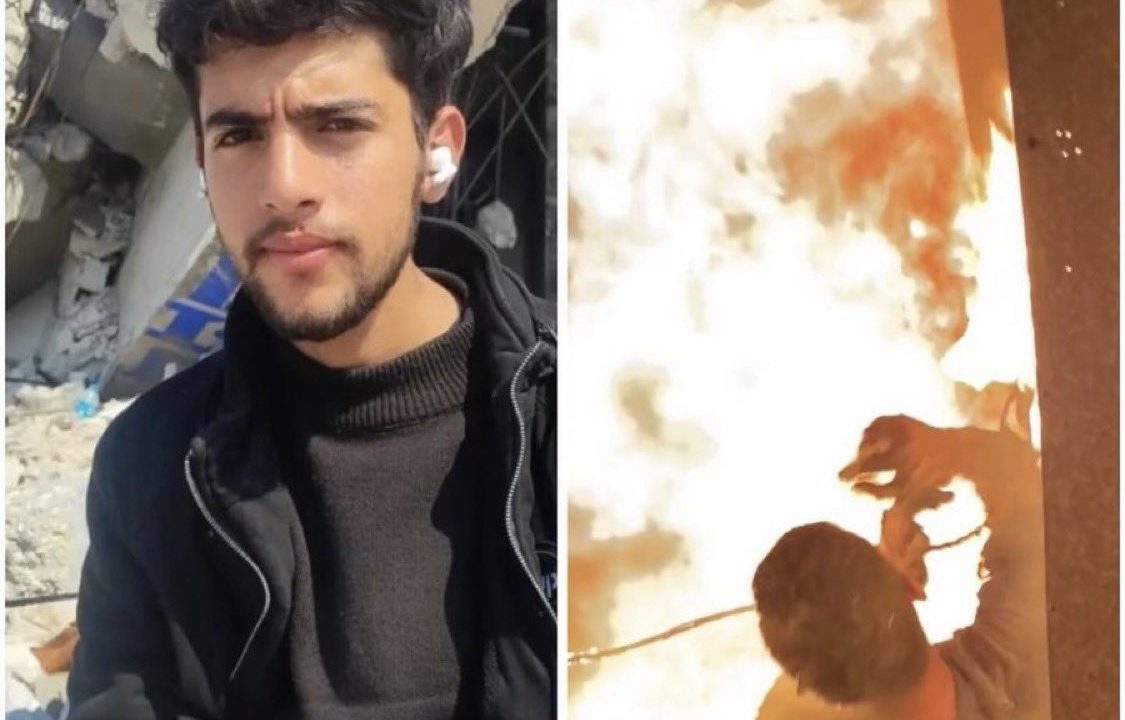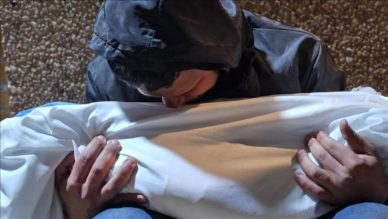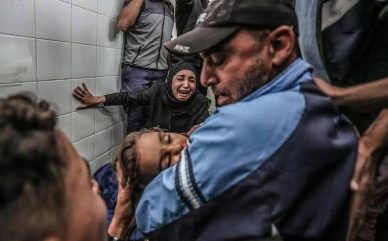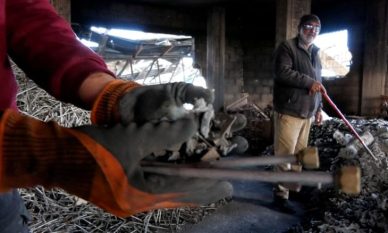GAZA, (PIC)
“I was at the height of helplessness; I couldn’t do anything.” With these words, Ahmad Al-Dalo began to recount the bloody night when Israeli rockets consumed the body of his son Shaban, while the world witnessed his burning along with three other displaced individuals, including his wife.
Ahmad, a displaced person from Gaza City, said, “The situation is very difficult; it’s hard for any human to imagine seeing his son engulfed in flames and being unable to do anything.”
Ahmad himself did not escape the large fire that spread across about 30 tents in the courtyard of Al-Aqsa Martyrs Hospital, as they were made of nylon and quick-burning fabrics. The father of five suffered second-degree burns on his face and right hand.
Despite his severe burns, he attempted to save his other children, “I saved my young sons and daughters. At that moment, the fire was consuming Shaban… I surrendered and asked for his forgiveness because I couldn’t do anything. I withdrew with a feeling I cannot describe… I was completely helpless… I watched my flesh and blood burning without being able to stop it.”
Who will hear the plea?
Shaban’s father called on decision-makers, those responsible, individuals with a conscience, and international organizations to save the remaining children and transfer them for treatment abroad, noting that two of his children are hospitalized in intensive care units.
The grieving father, who also lost his wife in the tragic bombardment, specifically appealed to Palestinian Authority President Mahmoud Abbas, Egyptian President Abdel Fattah el-Sisi, and Jordanian King Abdullah II, addressing them, “I beseech and implore with every word that carries such meanings, look at my children as you would look at your own. My children are in intensive care and at any moment, we could receive (bad) news—God forbid.”
Shaban Al-Dalu (20 years old) once dreamed of becoming a doctor, but his hopes for a scholarship did not come to fruition as his late mother, Alaa, had hoped and worked for. Alaa also perished in the same night, as the family’s circumstances did not allow them to bear the burden of medical school expenses. His father has been working as a driver since he lost his profession in sewing 18 years ago when the occupation imposed a blockade on Gaza.
The handsome young man, who achieved a score of 97% in his high school exams, turned to studying software engineering at Al-Azhar University. He worked hard to improve his English, appearing in a video he posted on social media, speaking about the brutal starvation war and how he was displaced for the fifth time, eventually settling in the courtyard of Al-Aqsa Martyrs Hospital.
Shaban was not an ordinary young man; as the eldest son, he took it upon himself to support his father in caring for their family of six, who, like other displaced people, suffered from repeated displacement, homelessness, limited food, and a severe shortage of medicine.
His brother, Mohammed, recounts the details of Shaban and their mother’s martyrdom and how they were completely consumed by the Israeli missiles in the seventh attack on the tents of displaced people at the hospital in central Gaza.
Mohammed mentions that Shaban survived an Israeli airstrike on a mosque across from the hospital on October 6, sustaining varying injuries to his head. He explains that Shaban usually slept in the mosque but returned to the family tents after the mosque was bombed, noting that he used to compete with his friends in reciting the Quran.
“I survived by a miracle,” he adds. “In the mosque bombing, Shaban survived against all odds, but he did not survive the bombing of the tents and was completely burned along with my mother. My father and siblings were in the same tent, and my father tried to save everyone but only managed to rescue my sister and younger brother.”
With tears in his eyes, Mohammed continues, “Shaban told my father he could get out of the tent while my mother was trying to extinguish the fire with clothes. Shaban and my mother were martyred while all my family members suffered severe burns, and I survived because I was outside the tent.”
He expresses deep sorrow, “I didn’t recognize my mother when I saw her, and we had difficulty identifying Shaban’s body; none of his features were clear, even his clothes were completely burned, and we found no signs to identify him.”
He adds, “The fire was raging, consuming everything, and my father tried to save him but couldn’t. The fire in the tents was indescribable; it was very large and high, and I fainted after witnessing my family burn before my eyes.”
There is no difference between Israel and Nazism, says Shaban Jibril Qweider, a family acquaintance, emphasizing that Shaban’s ambitions and dreams were as grand as his initial dream of becoming a doctor with a significant impact on humanity. He confirms that the failure of his attempts to study medicine never diminished his determination.
Shaban, a memorizer of the Quran, was the eldest among two sisters and three brothers, cherished by his parents. Everyone noticed his strong attachment to his mother, a bond so profound that it was evident on his social media page, until they were martyred in each other’s arms.
Matthew Miller, the Spokesperson for the United States Department of State, when asked about the incident, merely repeated his earlier response, claiming to understand the difficult environment in which Israel operates and describing the scenes of Shaban’s burning as “horrific.” When asked if he considered what happened inside the hospital horrific enough to be deemed a war crime, he said, “I cannot make that kind of assessment right now; facts must be evaluated before any individual decision!”
Spanish MP Loni Pillara raised a photo of Shaban Al-Dalu inside the Spanish parliament, angrily questioning the difference between the gas chambers under Nazi rule and what Israel is doing today, stating, “There is no difference.”















